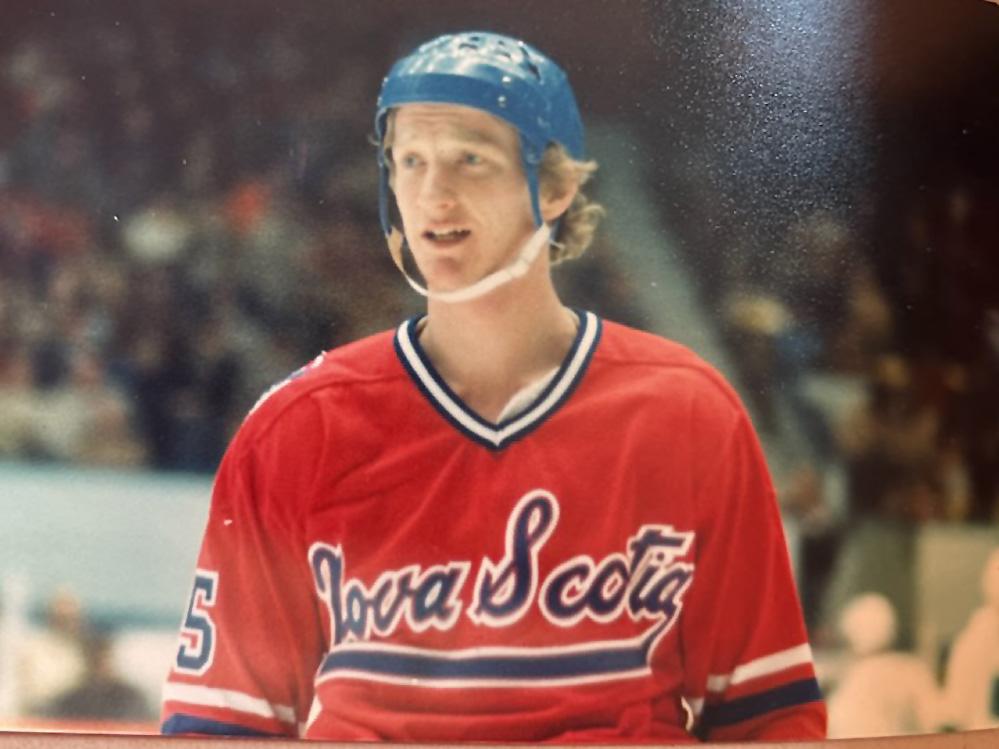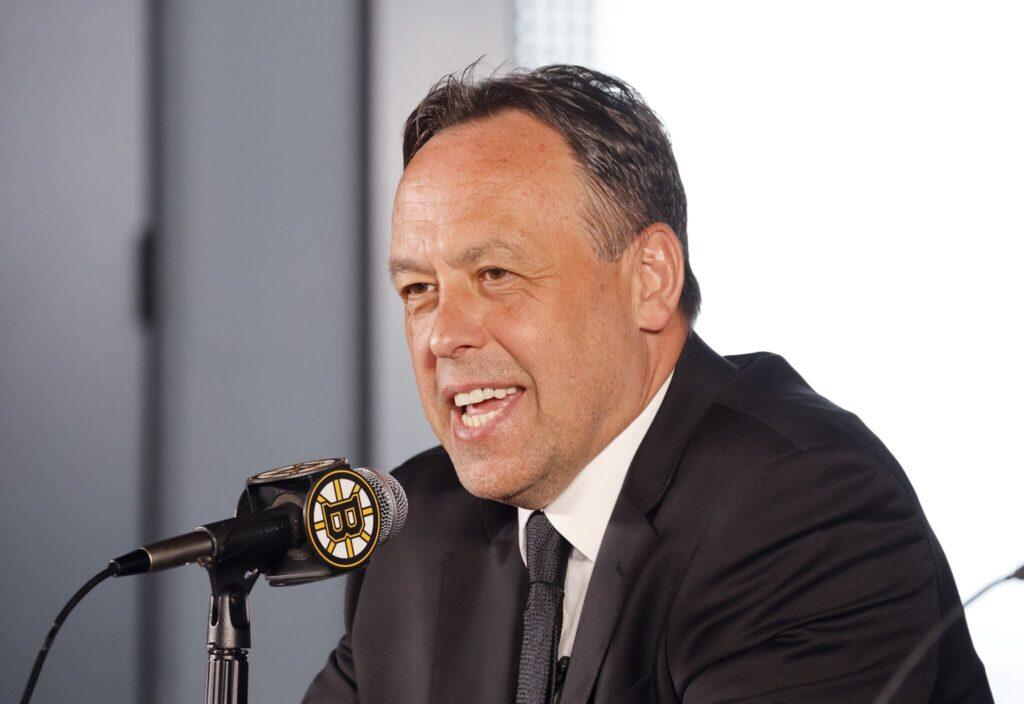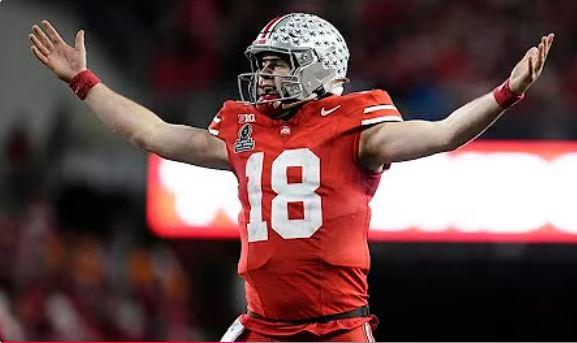Not many people can say that they turned down Gordie Howe.
”Yeah….I know. Tell me about it. Some people aren’t that smart.”
At 20 years of age, Marvelville, ON native Moe Robinson had a difficult life decision to make. A fourth-round pick of the Montreal Canadiens in the recent 1977 NHL draft, he knew he’d be in tough ever cracking the stacked lineup. Several days after the Canadiens selected him, the New England Whalers chose Robinson 15th overall in the WHA draft, and he was invited down to Hartford for a visit. Little did he know he’d be dining with Mr. Hockey.
Yep. I had supper with Gordie Howe,” recalled Robinson. “So yes, I really did think about it…honestly.”
The Whalers had just added Howe and his sons Marty and Mark from the soon-to-be-defunct Houston Aeros, and they joined former Toronto Maple Leafs legend Dave Keon and Bruins multiple Cup winner Johnny McKenzie on a team full of legendary veterans.
”We were at the hotel just attached to the arena so they were just showing me what the facilities were like,” said Robinson. “He didn’t really say a lot about the team in trying to coax me or anything. We just had a good old-time visit, had some supper together, and shot the shit. It’s too bad that it was so long ago that I don’t really remember much of the conversation.”
What Robinson most remembers is rejecting Hartford’s offer after some serious soul-searching.
”If hindsight was…you know…I would have…I should have. But hindsight is 20/20,” said Robinson. “At that time, some of the WHA teams were starting to fold, and if I go there, am I done playing hockey? Where am I going to end up? I would have been playing in Springfield if they had sent me down, which wasn’t a bad place to play.
”Hartford was a beautiful city, and I was there for a weekend. Had a big chat. The money was about the same. It wasn’t a lot of money…like $12,000 for a year. The signing bonus was $5000.”
The NHL offered much more stability at the time, and even though it would be difficult to win a spot on a Montreal blueline that included his legendary older brother, Larry, Robinson chose to sign with the Canadiens.
”Larry always talked very highly of Al McNeil and how much he helped him develop into what he was,” said Robinson. “McNeil was going to be my coach. Hartford? They might not even have a team the next year, I might not have a job. I figured I’d go with Montreal because of Al McNeil. And then Al never ended up being our coach. He became a consultant.”
Robinson would toil with the AHL’s Nova Scotia Voyageurs while the Canadiens were in the midst of winning four consecutive Stanley Cups. Few rookie spots were available on the team during that period, and Robinson’s only chance to get into the lineup came in mid-December 1979 when brother Larry suffered an injury, and they needed to call up a defenceman.
”I had to fly out of Halifax in the morning to get to Edmonton and then play that night,” said Robinson. “I got into Edmonton and had a snack. My sister (Carole) lived just outside of Calgary, so they didn’t have time to drive there, and the weather was bad.”
Sister Carol didn’t miss much, as Moe never played a shift against the Oilers.
”I sat on the bench,” said Robinson. “I opened the door. We were down like 5-2 and I’m sitting there….no ice. Okay…great. So the next night, we flew to Winnipeg. (Montreal coach Claude Ruel) comes to me, and he says – ‘You’re going to play with Serge (Savard) tonight. Serge – he will look after you.’
”I thought – ‘You’re really building my confidence there, Claude.’ No advice on moving the puck here or there…just ‘You’re going to be fine.’”
Robinson’s one and only NHL game didn’t have many memorable moments in large part because he barely saw the ice.
”I had about six shifts,” said Robinson. “I might have played about three minutes or so. The only shift I remember really well… I had a breakout, and I had Flower on the boards. I put it off the boards, and he picked it up off the boards, went in on a breakaway, and hit the post.
”And then when I got sent back down to Halifax, the guys were saying, “Why didn’t you take a slashing penalty or something…we’ve got to see you in the summaries.’ If you ever got called up, you had to do something stupid so you’d at least get in the summaries.”
Robinson has never been able to find photograph evidence of his NHL experience.
”To this day, I’m still trying to find a picture of me either on that bench or on the ice in Winnipeg, and I’ve never found one.”
While playing an NHL regular-season game will always be first on his list of hockey achievements, his fondest NHL experience came during the 1979 training camp, when he got to play an exhibition game paired with his brother.
”Boom Boom (Geoffrion) started the year (as the coach), and he kept me around for a few exhibition games,” said Robinson. “I played in Buffalo and Toronto, and I played a game at the Forum against Philly, and Larry was my partner. It was Yvan Cournoyer’s last game ever. We tied Philly 2-2, and Cournoyer scored both goals. His back was done.”
For most rookies attending Montreal’s training camp in the 1970s, being in a dressing room full of hockey legends was intimidating. Robinson had at least met many of them through his brother Larry in the years leading up to his first camp.
I was a little more comfortable than most rookies, but it was still intimidating, and it was the Forum,” said Robinson. “Then training camps…they’d make four teams and play round robins. A game in the morning and a game in the afternoon. There was a pot you could win at the end of the tournament.”
Training camps were much different in those days, with little emphasis on drills.
”There was no practising…we played games,” said Robinson. Serge (Savard) was on my team, and he’d have his skates over his shoulder, his long trenchcoat, and his cigar. Serge said, “I’ve never had the skate on since last season, and I’ve never won the training camp tournament. So there you go boys.’
”You better be in shape before you got there because you’re playing games, and it was full-bore games. Hitting… it was like you were in a real game. There were scraps. You were fighting for jobs. And then you’re chasing down “Flower”.
Robinson’s strategy for trying to contain Guy Lafleur in training camp scrimmages was simple: “Keep him to the outside…don’t let him cut in.”
As daunting as it was to play against Lafleur, it was Murray Wilson who often gave him the most trouble
”Whoa. Two strides, and he would be by you,” acknowledged Robinson. “But back in those days, you could actually stand up and take him out beforehand; it wasn’t called interference. My God, he was quick.”
Robinson may have only played in one NHL game, but he was called up at the end of the 1978-79 season to serve as a “black ace” after Nova Scotia was eliminated from the AHL playoffs and the Canadiens won their last of four straight Stanley Cups.
”Five of us got called up,” said Robinson. “Rick Meagher, Jean Lemieux, Richard Sevigny and Dave Lumley. We never practised with them, we practised separately. Talk about bag skating. Five guys. You’ve got to be ready…you never know.”
Robinson spent three years with the Voyageurs in the late 1970s. While they were competitive and won a few playoff rounds, the club never captured the Calder Trophy in that era.
”We had a lot of smaller guys,” said Robinson. “Fast. I think Keith Acton was there. Kevin Reaves, Norm Dupont. We had a lot of talented guys.”
In the late 1970s, the AHL was dominated by tough guys and Philadelphia’s farm team was always stacked with behemoths who loved to scrap.
”In the AHL, some nights were pretty crazy,” said Robinson. “We had a couple of big brawls with Maine. They were still the Broad Street Bullies. Frank Bathe, Dave Hoyda…he was huge. Bob McCammon was coaching in Maine. If there was a situation…he would just say “Everybody go.’”
In the 1970s, bench-clearing brawls weren’t penalized. You didn’t get kicked out of the game for leaving your bench to fight, and brawls were a regular occurrence.
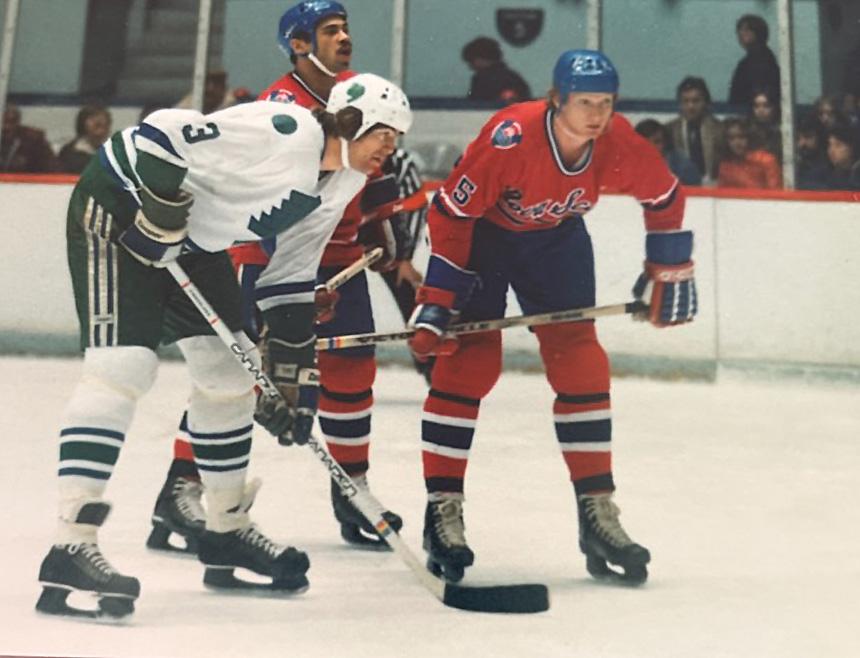
””
Robinson didn’t go out looking for fights, but sometimes they found him. He remembers one night in particular when he ended up sparring with Maine defenceman Glen Cochrane, one of the most prolific fighters of that era. When Cochrane cracked Philadelphia’s lineup in 1980-81, he accumulated 219 PIMs in just 31 games as an NHL rookie.
”I had a big scrap with him. Whoa,” said Robinson. “We went for a long time because it was a bench-clearing brawl, and we were back and forth, back and forth, and then I ended up getting him over by our bench, and I just threw him down on our bench. I had him between the bench and the boards and just held him down. He could throw them fast, and I think he was a leftie too.”
At 6-4 and in possession of those Robinson farm boy genes, Moe never hesitated to back up his smaller teammates in Nova Scotia, and there were a number of games where he and Chris Nilan had to protect the flock. To nobody’s surprise, it was usually “Knuckles” Nilan that instigated the brawls, and Robinson recalls one game in particular where the two of them found trouble, thanks mainly to Knuckles.
”The fighting starts out, and we’re backing up into the corner,” said Robinson. “He says: You take the guy on the right, I got the two on the left.’ All of a sudden, their goalie comes through the line to take both of us, and Knucks smokes him. The goalie’s out (cold). Then the benches emptied, and I thought, ‘Oh…here we go.’ It didn’t matter how big they were. (Knuckles) didn’t care.”
Longtime OHL coach Bert Templeton took over the coaching duties from Frank St. Marseilles in Robinson’s third AHL season and left a big impression on him.
”Bert Templeton was the best coach for me,” said Robinson. “He gave me the most confidence I think I ever had playing. He’d talk to me and say, ‘You can do this. Just go out, play your game, be calm. You can move the puck.’
”Sometimes when you’ve got a guy that’s yelling and screaming at you, you lose your confidence but I got to play power play. I think I got 40 points.”
He did, indeed. At that point in his career, however, Robinson saw the writing on the wall. The Canadiens still had The Big Three on defence along with Brian Engblom, and a fellow named Rod Langway was already developing into a defensive stalwart who would go on to win consecutive Norris trophies with Washington. Robinson got cut again at Montreal’s 1980 training camp, and he decided he needed a change of scenery.
”When they were sending me down for the fourth year, I went in to see Bert, and I told him my situation, and he said, ‘I don’t blame you. Whatever you need to do.’ And I said either they’re going to trade me, or I’m going to shut her down. I’m not going to play four years down here.’
”So I went home, and I told my agent what was going on. You can move me, or I’ll shut her down and look for something else to do. Then (Minnesota’s GM Lou Nanne) called me about two weeks after I was back home. He said, ‘Would you consider going to Oklahoma City? We’re working a deal out for ya.’”
Oklahoma was Minnesota’s farm team, and Robinson figured he would have a much better opportunity of making the Stars than the Canadiens, so he headed to Oklahoma to play in the Central Hockey League.
Robinson spent a season in Oklahoma, hoping to have his rights traded to Minnesota, but the trade was never completed.
”They were supposed to be making this deal,” said Robinson. “I heard the name was supposed to be Serge Beaudoin. But at the end of the year (Montreal management) said, ‘No…the deal’s not going through. You’re still Montreal property.’
That was the last straw for Robinson, who moved back to the Ottawa Valley to pursue a second career.
”I said, ‘I’m 24 now. I’m still young enough I can start another career.’ I’d gotten married. So I went back to school and got my real estate license. I had a cousin who owned his own brokerage in Winchester.”
The timing couldn’t have been worse to get into real estate in Canada as the interest rates had skyrocketed to 18 percent.
”I went at that for about a year and a half and just couldn’t make ends meet,” said Robinson, who soon lucked into what would become his lifelong occupation.
”I was living in Vernon and had a pumped-up car,” said Robinson. “I had a 1970 Dodge Dart Swinger 340 four-speed I’d bought in high school when I was 17, and I liked to do the mechanical stuff, so I had to do the heads on it, so I was working on it outside of this local garage. The owner asked me, ‘Do you want to get into (mechanics)? I’m busy; I could use another guy. I said, ‘Yeah, I’d give it a try’. So I started in ’83 and have been doing it since.
I signed up as an apprentice, and I worked there for three years; then Larry bought a garage in Montreal that specialized in (fixing) Corvettes. The original garage was right across from the Forum.
”He bought another building near Blue Bonnets (Raceway), and they turned it into a garage, and he said, ‘Do you want to come down here and maybe end up running the mechanical part of it?’ I said sure, why not?’ We spent five years down there.”
Brother Larry signed with Los Angeles after the 1989 season, and a decision had to be made regarding the garage in Montreal.
”Quebec was having the referendums, and it was kind of going weird,” said Robinson. (Larry) said, ‘What do you want to do? I’m thinking of selling the building.’ So I headed back to Ontario, and he sold the building.”
Like many a small-town boy, Robinson returned to his roots, and he’s lived in Gloucester ever since, not far from where he grew up in Marvelville, a farming community best described as a hamlet.
”We had a store, a post office, a one-room schoolhouse,” said Robinson. “We did have a church, and it burned, or something happened to it. We had an Orange Hall, too, and it disappeared.”
Leslie and Isabel Robinson raised five children on a dairy farm – Brian, Carol, Larry, Linda, and Morris, who quickly became known as Moe.
”Everyone called me Moe as far back as I can remember with the exception of a couple of aunts that called me Morris,” said Robinson.
Broomball was the primary winter sport in the area in those days. Nearby Embrun is famous for its broomball teams, and even though father Leslie and uncle Ray were both broomball players, Leslie’s three sons gravitated toward hockey.
”I couldn’t run on the ice,” said Robinson. “I needed some traction. And we were always playing hockey, so there was never any time to play broomball.”
Robinson would get plenty of practice on his skating skills every winter before ever stepping onto a rink.
”I skated to school,” recalled Robinson. “We had a creek that ran from our place right past the school. I used to skate to school and then climb up the bank.”
Older brothers Brian and Larry were big influences on Moe as he grew up. Brian, the eldest, played Junior B hockey in the mid-’60s.
”He started with the Russell Lions, and they became the Metcalfe Jets,” explained Robinson. “I was the stick boy, and Dad was the general manager. Back then, it was just the six-team league.”
Both Moe and Larry are 6-4 and noted for their toughness, but Brian was also an intimidating figure in his day.
Brian was 6-3 and huskier than both of us growing up,” said Robinson. “Larry and I were skinny… and (then) Larry kind of took off, and I stayed skinny. He got more muscular, and I tried everything. Ate these milkshakes and worked out with weights. The highest I got to…I went to one camp with Montreal, and I think I was 195…at 6-4. I played junior at about 175.”
There were no ice pads operating in the summer in those days, so hockey players often played fastball in the summertime.
”We were all good fastball players,” noted Robinson. “Brian was pretty good. He was a pitcher too. We all played on the same team at one time.”
The Robinson brothers were part of a fastball team uniquely dubbed the Marvelville Z’s.
”We had this local gentleman that coached us when we were young,” explained Robinson. “We just went as Marvelville for a name. We had a (falling out) between us, and we fired him.
”About four or five years later, he makes up an All-Star team of players in and around the Russell area and calls them the Marvelville A’s. So we became the Z’s. We beat them 1-0. It was a barn burner. And then he never put another team in again.”
In the 1970s, Larry would come back home every summer after his NHL season and play fastball. He spent a couple of years on the famous Turpin fastball team, which has won many Canadian championships, but most summers, he played intermediate fastball with his brothers. The Z’s put a lot of opponents to sleep in those days.
”We were farmer’s kids that all lived in Marvelville with a radius of about a five-mile span, and we had enough guys to field a team,” said Robinson. “We always played together, and we had a great team. We won a pile of tournaments.”
Metcalfe started a senior team that Brian joined when Moe was in his mid-teens. They were short on players, so they asked Moe and a couple of his buddies to play.
”We were playing Kemptville in Metcalfe, and I think the mayor of Kemptville was a defenceman, and I was playing forward,” said Robinson. “I went in, and he gave me a shot, and I went into the boards, and I put my hands up, and my wrist just snapped. He was about 225 pounds, and I was a buck fifteen.”
Robinson followed in his brothers’ skate steps and played Junior B with the Metcalfe Jets at 16 in 1974. The following year, he was invited to try out for the CJHL’s Gloucester Rangers, and he made the team.
John Barrett was Moe’s defence partner with the Rangers in his second CJHL season. Barrett went on to play 488 NHL games, mostly with Detroit.
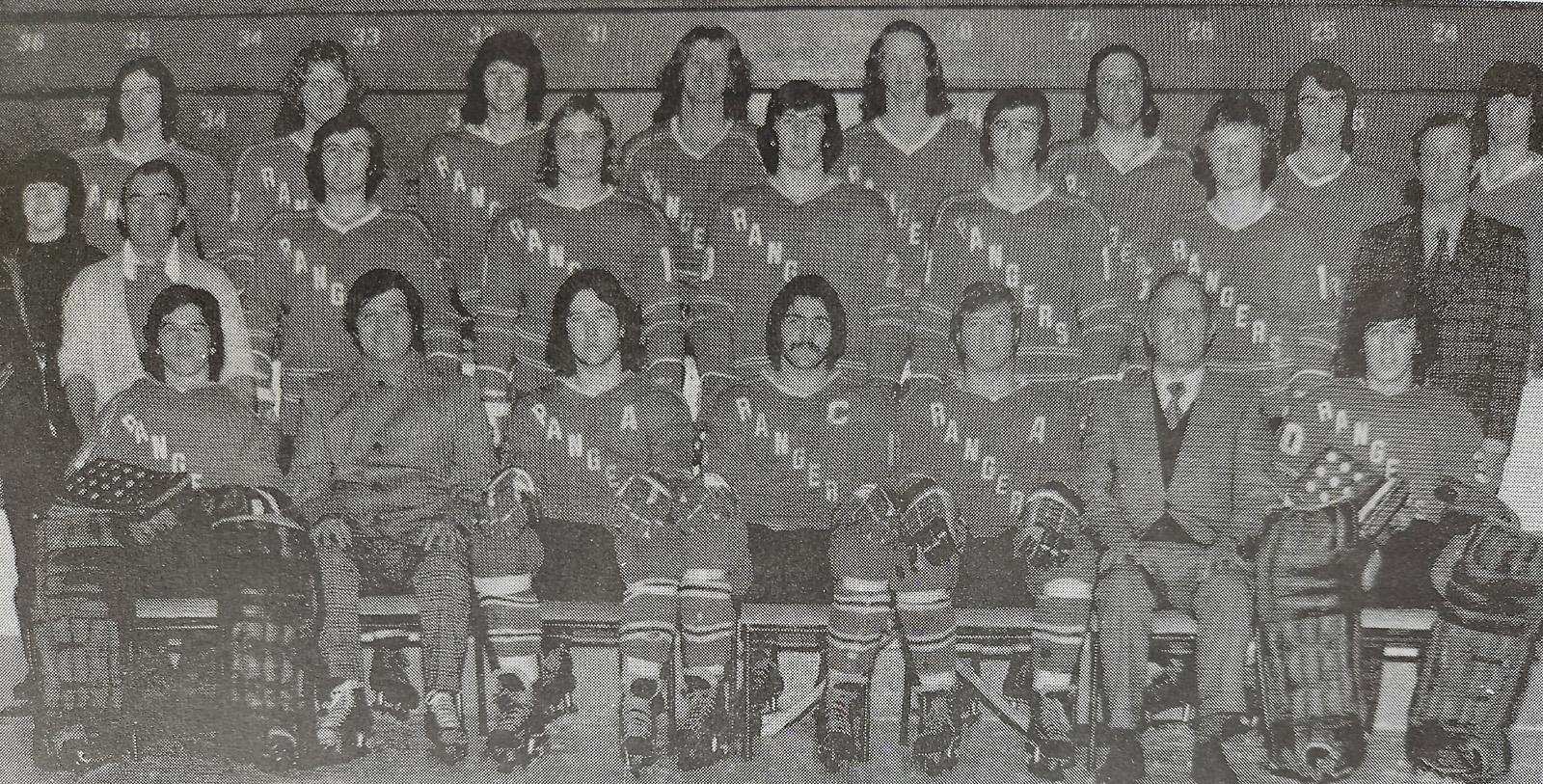
The 1974-75 CJHL’s Gloucester Rangers. Moe is in the back row, fifth from the left.
”We had a pretty good team that year,” said Robinson. “The Lortie boys from the Casselman area. They were pretty good goal-scorers. We made a run for it. We beat Smiths Falls out. Then I think we lost to Pembroke.”
None of the Robinson brothers were drafted by OHA clubs, Both Larry and Moe would best be described as late bloomers.
”Our games just came around a little later, and sometimes it’s just being in the right place at the right time,” said Robinson.
The right time for Moe was CJHL All-Star game in 1976 when the CJHL’s best players faced off against the Ottawa 67’s.
”I think a few people noticed me, and Larry was already in Montreal,” said Robinson. “I was talking with him, and he said, ‘Well, I can get you a tryout if you want to come down and try out for the (Montreal) Junior Canadiens.’”
The Junior Canadiens were a QMJHL powerhouse at the time, and they were anchored by Robert Picard and Mark Hardy on defence.
”I went down there for a week and a half or so, and they said, ‘No, we don’t have any room for you,’” said Robinson.
”Punch Scherer, who just happened to be the GM of Kitchener when Larry was there, was now with Kingston, and he found out that I got let go by Montreal, and he called me and asked me if I wanted to come down to Kingston.”
Robinson would make the most of his opportunity this time around.
”I was never expected to make the team,” said Robinson. “There were a lot of good hockey players there too. We played an exhibition game against Peterborough, and I caught this guy with his head down. After we went into the dressing room, Kenny Linseman came to me and said, ‘Welcome to the team.’ I said, ‘What?’
”Then, the next day, I signed to stay on. That was a big relief because it was nip and tuck there. I didn’t have a clue. Nobody says a thing to you. You’re an outsider, and I was 19. I played with Bob Parent (as a defence pairing). It was a lot of fun.”
The Canadians had a very strong team led by Linseman, Tony McKegney, Mike Crombeen, Rob Plumb, Mike Simurda up front; a defence that included Robinson, Jay Wells, Brian Crombeen, Parent, Brad Tamblyn, and Lowell Loveday; and Jim Lockhurst in goal. All 12 would be drafted by NHL teams, with Linseman, Mike Crombeen, and Wells selected in the first round.
”We had a really good team that year,” said Robinson. “That was the first year they had the World Juniors. Whatever team was in first place at Christmas (St. Catharines) got to go to Europe. The second-place team ended up going out west to the Labatt Cup.”
”We were in second place (in the OHA), so we got to go. We were playing against all-star teams from the WHL, QMJHL, and Russia. We played out of Calgary, Lethbridge, and Medicine Hat.”
The tournament was filled with future NHLers, including Barry Beck, Stan Smyl, Brad Maxwell, Barry Pederson, Bill Derlago, Steve Tambellini, and Ryan Walter on the WCHL team; Mike Bossy, Lucien Deblois, Robert Picard on the QMJHL squad, and Sergei Makarov and Aleksei Kasatonov on Russia. Ontario added Bobby Smith, Doug Wilson, and four other OHA all-stars for the event, but the western all-stars proved to be too much for the understocked OHA team. The WCHL went 6-0, the QMJHL was 4-2, the OHA finished 2-4, and the Russians were winless.
The West was stacked,” recalled Robinson. “They beat us pretty good.”
Kingston faced Ottawa in the OHA playoff that year and had a memorable eight-game series. In those days, if you were tied at the end of regulation, there was no overtime, and each squad got a point. The first team to get eight points won the series.
”We were up 7-5 (in series points)…up until the fight,” said Robinson. I think our captain, Mike Crombeen, got hurt. So he was down too. We were down two of our best guys, and then they came back and won the next two games.”
”The Fight” Robinson referred to was an infamous incident that could best be described as gory. Linseman kicked Ottawa defenceman Jeff Geiger between the eyes, and the amount of blood he lost was frightening.
”Geiger played tough,” said Robinson. “It likely was a crosscheck that got (Linseman) high, and then a scrum started up between the two of them, and they were throwing them back and forth, and then the linesman came in to break it up, and he knocked Jeff down.
”The other linesman had a hold of Kenny by the arms. Jeff fell to his knees, and Kenny just hoofed him with the skate right in the forehead. I’ve never seen so much blood in my life. It had to hit an artery because it had to shoot a foot directly out of his head. It was scary.
”I looked around, and usually you think, “Here we go…there’s going to be a bench-clearing brawl. I had ahold of Jimmy Kirkpatrick…everybody was paired up. Jimmy and I just kinda looked at each other. ‘Somebody get somebody out here quick….he’s going to die.’ It just changed the whole series.”
The Ottawa daily newspapers’ front page the next day featured a photograph of Geiger’s bloodied face, and Linseman was forever known as “The Rat” for the rest of his hockey career and beyond.
”Kenny played on the edge,” said Robinson. “He was a good hockey player, but he played on the edge, and he was very emotional. If the linesman maybe wasn’t holding him and just let them go…..you can say this or this or this…and it never changes the outcome of it.”
It was an era that featured plenty of bench-clearing brawls and multiple fights per game. Players weren’t penalized for leaving the bench to get in altercations. In today’s game – leaving the bench results in automatic game misconduct and suspension in every hockey league. Robinson wasn’t a regular fighter, but he got in a few scraps, including one other memorable night in Ottawa between the two heated OHA rivals.
”Larry came down from Montreal to catch the game,” said Robinson. “In the first period, there was a tussle between me and Ed Hospodar. I had fallen down. I went to get back up, and Ed Hospodar cross-checked me back down again. I tried to get up and he did it again. So then I got up…and I was riled eh…so I got up, and I just started throwing…he went down, and I just kept throwing. So I was Third Man In, and I got kicked out of the game. Larry saw me play for about three minutes.”
The 67’s were led offensively by Bobby Smith, who would set an OHL record (192 points) the following season that still stands today. The Canadians did a decent job of disrupting him in that series, to the point where he was quoted in the local paper saying, ‘The Kingston defence… all they do is hold and hook.’
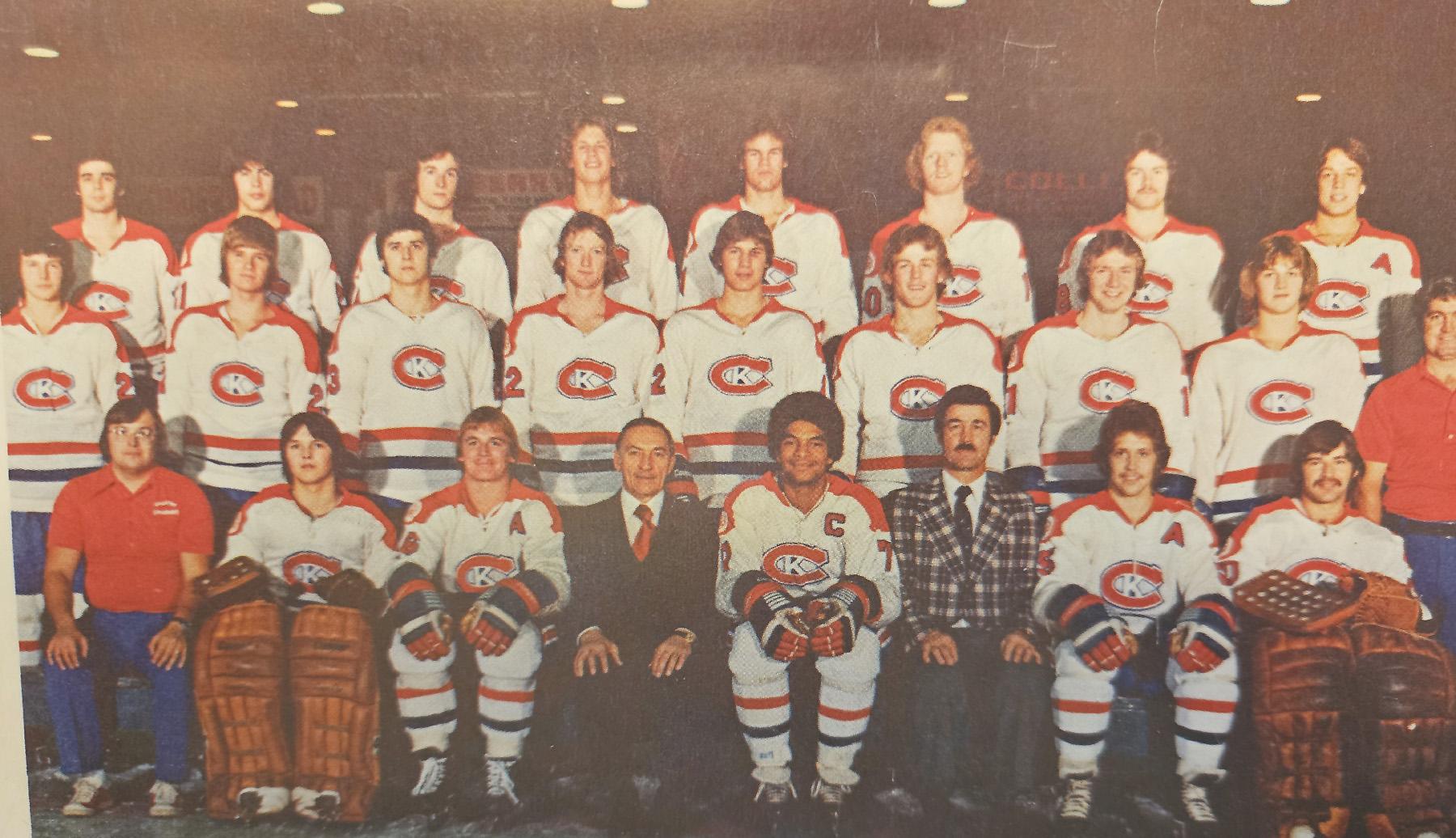
The 1976-77 Kingston Canadians. Robinson is middle row, fifth from the left.
”Well, what else were you going to do?” asked Robinson. “Get in his way and hold onto him. So we had him frustrated. Usually, when they start talking about ya, they’re frustrated.”
Ottawa would gain momentum from that series and go all the way to the Memorial Cup final before bowing 6-5 to the New Westminister Bruins.
Not long after the Memorial Cup, the NHL draft was held, and it was a completely different atmosphere than today’s proceedings, which has all of the prospects attending, huge crowds, and coverage on multiple television networks.
Robinson was helping brother Brian bring in the hay on his Marvelville farm when he discovered that the Canadiens had chosen him in the third round at 49th overall.
”I got off of the tractor, and he says, ‘There’s a phone call for ya.’ I think it was Doug Robinson, one of the scouts.”
Robinson wasn’t expected to get drafted by his brother’s team.
”I thought for sure I was going to Atlanta because the agent I had, Norm Kaplan, kept saying the Flames were interested,” said Robinson. “I thought: ‘It would be nice to go to Atlanta’, and then I hear Montreal and it was like…
Robinson knew the Canadiens well, obviously, and he knew he’d have a tough time winning a roster spot. Getting an NHL opportunity can often be about circumstance and timing, and Robinson’s style was more suited to an earlier era. Perhaps he would have been able to carve out a career with the Canadiens if he had come up through the system a decade earlier when the club wasn’t as deep on the blueline.
”When I was in Oklahoma City, Harry Howell and Gump Worsely came in,” recalled Robinson. “They were the two scouts, and they said: ‘You know – you were born in the wrong era. You should have played in the 60’s. More of the stay-at-home, move-the-puck-up type of a player.’ Which I took as a compliment, coming from those two guys.
”That’s basically all I tried to do. Get the puck and move it to the forwards as quickly as I could. I wasn’t much of a take-off and rush-the-puck type. My job was to get it out of our end and to get it moving.”
Brother Larry had no qualms about rushing with the puck – it was one of the many attributes that earned him superstar status during his spectacular Hall of Fame career.
How was it for Moe growing up in the shadow of one of the most outstanding defenceman who ever played the game?
It’s been pretty good,” said Robinson. “Every game he played, I played watching it. Always rooting for him. You know your siblings…you’re watching a game, and you’re just as nervous or maybe more nervous than he is because he gets to go out on the ice and hit somebody, and then you relieve the tension. You’re watching, and you can’t do anything about it.”
Larry’s introduction to the fame and adulation he would soon garner in spades was the overtime goal he scored in his rookie season. Montreal trailed Philadelphia 1-0 in the 1973 semi-finals, and a loss in Game 2 may have been too much to overcome with the series heading back to Philadelphia for the next two games. Moe remembers the moment very well.
”I was at my buddy’s place,” said Robinson. “He rushed it up, went to give it to Frank Mahovlich, and he said, ‘Keep it.’ Frank was talking about that goal (recently) when we were in PEI at a golf tournament. He said: ‘I didn’t want it, I was tired.’”
One of the other defining moments of Larry’s career early on was when he beat up Dave Schultz at the Forum on Feb. 17, 1974, a Saturday night game that was shown nationally and cemented Larry’s reputation as one of the toughest players in the league. It served notice to the Broad Street bullies that the Canadiens would not be intimidated, and when the two clubs met in the Stanley Cup final two years later, the Canadiens swept the Flyers on their way to winning four consecutive Stanley Cups.
”A lot of people saw that game because it was on TV, but before that, he fought a lot. And many big, tough, older guys,” noted Moe. “He didn’t fight a lot after that. He didn’t have to. Larry had that respect with all of the players. He still does.”
Larry’s highest penalty minute total in a season was 76, and after 1976, he never accrued more than 45 penalty minutes in a season.
”I think he just went out to protect his teammates,” said Robinson. “That’s the way both of us played. If there was an altercation, we’d always be there. Stand up for your teammate. And I think when (John) Van Boxmeer took the sucker punch on (Feb. 17, 1974), no matter who it is, you’re going to come out and defend your teammate. I think that’s what happened. it wasn’t pre-meditated.”
The only player in the late 1970s that seemed to truly get Larry revved up was Boston defenceman Mike Milbury. They got into several altercations, with Milbury baiting Larry into dropping the gloves and getting off of the ice for five minutes.
”Milbury was that type of a guy,” said Moe. “When he got in a scrap, he’d kind of hold onto you and duck. Somebody from Boston in one series said, ‘Just leave Robinson alone. Let him sleep.’ And then Milbury would wake him up, and Montreal would be ahead 5-0.”
One Bruins tough guy who Larry never fought was John Wensink, who grew up 45 minutes from the Robinsons in nearby Maxville.
”Two local boys,” said Moe. “You can’t fight (your neighbour).”
Moe played in an alumni game with Wensink a few years back, and his respect for Larry was evident.
”He thought the greatest things of Larry,” said Moe. “He thought he was the greatest guy. He said nothing about fighting; he just said he was a great man.”
From a great family. Moe was a pleasure to interview. He was humble, affable, and polite, much like his famous brother. Valley folks are proud to call them our own.

